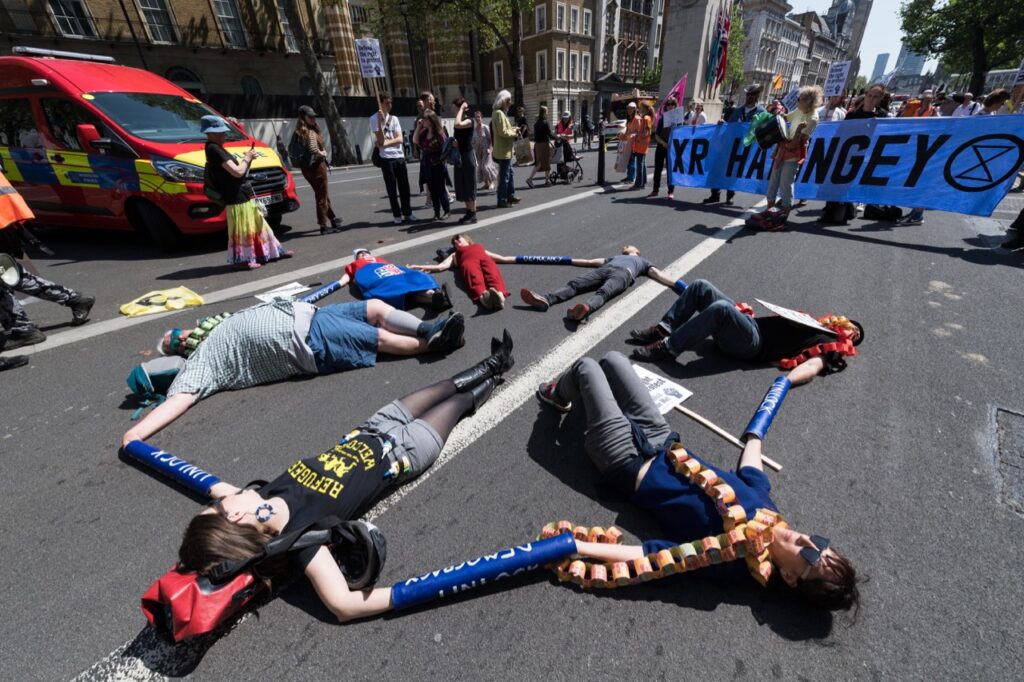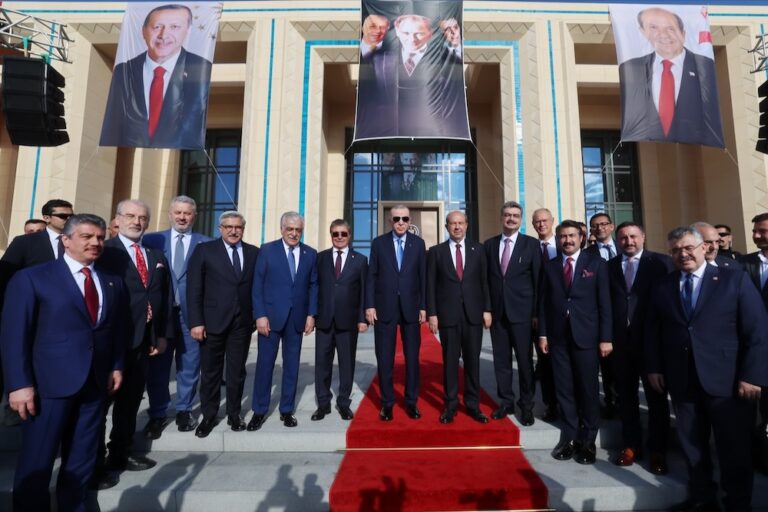May 2023 in Europe and Central Asia: A free expression round up produced by IFEX's Regional Editor Cathal Sheerin, based on IFEX member reports and news from the region.
Erdoğan’s re-election promises ongoing rights abuses and persecution of the independent press; a bad month for civic space in the UK; UN experts call for the release of Belarus’s political prisoners; and lawmakers in Hungary vote to partially decriminalise defamation.
Free but unfair
“Media bias and ongoing restrictions to freedom of expression created an unlevel playing field, and contributed to an unjustified advantage of the incumbent”.
That was how a joint mission of international observers described the re-election of President Recep Tayyip Erdoğan in Turkey on 28 May.
Although the election experts recognised that the process was “technically” well run and that voters were given clear alternatives, they highlighted the prevalence of “inflammatory and discriminatory language” by both contestants during the campaign period, and the “intimidation and harassment of supporters of some opposition parties”.
An old-hand in the use of inflammatory and discriminatory language, Erdoğan served up plenty to his supporters as soon as his re-election was confirmed.
In two victory speeches on election night he dismissed opposition parties as “pro-LGBT”, warned of “infiltration” by “perverted movements” (i.e. LGBTQI+), and reiterated his commitment to keeping opposition politician Selahattin Demirtaş in prison – even though the European Court of Human Rights has called for his immediate release.
Between the first and second round of the presidential election, Reporters Without Borders had warned that the overwhelming bias of Turkey’s national media in favour of Erdoğan “massively rigged” the process, depriving citizens “of the means to reach democratic decisions”.
Following confirmation of the result, the Journalists’ Union of Turkey said it would “not allow journalism to be destroyed in this country”, despite the continuation of anti-press freedom policies that Erdoğan’s victory promises.
A bad month for civic space in the UK
May was a disturbing month for the rights to freedom of assembly, freedom of expression, and other rights in the UK.
“Causing public nuisance”
On Coronation Day (6 May), when King Charles was crowned, London’s Metropolitan Police arrested more than 60 peaceful protesters and activists.
Many of these activists were planning to peacefully demonstrate against the institution of the monarchy; several were arrested before any protest or celebration had even begun; and some of them had no plans to demonstrate at all.
Those targeted included: the campaign group Republic (which advocates for replacing the monarchy with a republic), and which had been liaising regularly with the police about their planned protest before they were arrested; Animal Rising (an animal rights and climate change campaign group), which saw 14 of its members arrested at a non-violence workshop several kilometres away from where the coronation celebrations were taking place; members of the Night Stars voluntary group, which works with the police on women’s safety initiatives, and whose members were arrested for being in possession of rape alarms; members of the climate change protest group Just Stop Oil and journalist Richard Felgate, who was filming the group at the time.
Several arrests were made under two new pieces of draconian legislation designed to crush public protest in the UK: the 2022 Police, Crime, Sentencing and Courts Act, which criminalises “intentionally causing public nuisance”; and the 2023 Public Order Act, which hands the police very broad powers to suppress virtually any demonstration.
The 2023 Public Order Act has been criticised by the UN High Commissioner for Human Rights for imposing “serious and undue restrictions on [the rights to freedom of expression and assembly] that are neither necessary nor proportionate to achieve a legitimate purpose as defined under international law”.
Many of those arrested spent the day in jail. Only four people were eventually charged.
“Chilling effect for public interest journalism”
Another mismatch between the law and justice occurred this month when the court of appeal ordered journalist Carole Cadwalladr to pay over £1m in court costs to businessman and prominent Brexit-backer Arron Banks.
The ruling was widely condemned by press freedom groups on the basis that it set a “chilling effect for public interest journalism”.
Free expression groups have long argued that Banks’s lawsuit against Cadwalladr was a Strategic Lawsuit Against Public Participation (SLAPP), the intention of which was to intimidate her into silence.
Banks brought his defamation suit against Cadwalladr in 2019, following a comment she made in a TED talk – that Banks was lying about “his covert relationship with the Russian government” – and a tweet linking to that talk. Banks argued that the comments implied that he would, for money, assist the Russian government against the UK government.
Banks originally lost his case: in 2022, the judge found that Cadwalladr’s remarks were in the public interest at the time they were made. However, the judge also ruled that the public interest defence was no longer viable after April 2020, when the UK’s Electoral Commission confirmed it accepted an earlier National Crime Agency conclusion that there was no evidence to support Cadwalladr’s allegations.
Although Bank’s reputation was found not to have been seriously harmed, he went to the court of appeal which, in February 2023, partially ruled in his favour. It concluded that he had been caused harm after April 2020 due to the still-published comments on Cadwalladr’s TED talk.
Tellingly, Banks did not pursue TED or The Observer newspaper (where Cadwalladr’s comments first appeared). Both of those outlets have far greater financial resources than Cadwalladr, and would not have been vulnerable to the same kind of pressure that she has had to endure.
“Toxic nature of public debate”
A recent survey of LGBTQI+ journalists in the UK found that 78% of those questioned felt that the country was becoming a more “dangerous place” to be an LGBTQI+ journalist: 86% had experienced abuse and harassment; and 78% said that media outlets were not doing enough to protect their LGBTQI+ employees. The study also found that the risk of abuse was particularly high when there was media coverage of trans issues.
The increase in abuse of LGBTQI+ journalists is mirrored in the experience of the wider UK LGBTQI+ population.
In a report based on his recent visit to the UK, Victor Madrigal-Borloz (the UN Independent Expert on protection against violence and discrimination based on sexual orientation and gender identity), attributes this increase in homophobic abuse – and a “rampant surge in hate crimes” – to the “toxic nature of the public debate surrounding sexual orientation and gender identity”. He singles out politicians, the media and social media commentators whose “abusive rhetoric” has fuelled this dangerous trend.
ILGA-Europe also points the finger at leading UK politicians and mainstream newspapers in its Rainbow Europe Map and Index (published this month), where the relationship between anti-trans rhetoric by high-profile voices and the rise in anti-LGBTQI+ hate crimes is made clear.
Political prisoners and a presidential pardon
In Belarus, late May brought surprising news with the presidential pardon of NEXTA editor Raman Pratasevich. This came less than three weeks after Pratasevich was sentenced to eight years in prison on several spurious charges.
While IFEX members welcomed Pratasevich’s pardon, they also called for the release of all of Belarus’s more than 30 imprisoned journalists. Speaking to Reporters Without Borders (RSF), the Belarusian Association of Journalists (BAJ) also raised concerns that Pratasevich could now be used as a propaganda tool by President Lukashenka’s regime.
The announcement of Pratasevich’s pardon came one day after the Day of Solidarity with Belarus’s Political Prisoners (21 May).
Marking two years since the death in prison of activist Vitold Ashurak, the Day of Solidarity was declared by the Viasna Human Rights Centre, whose chair – Nobel Prize winner Ales Bialiatski – is currently serving a ten-year prison sentence on trumped-up charges.
Several solidarity events were organised in Europe and the US.
Over 100 Nobel Prize laureates signed PEN International’s public letter calling for the immediate and unconditional release of Ales Bialiatski, and for an end to the crackdown on independent voices in Belarus.
IFEX also joined rights organisations in a public statement declaring solidarity with the political prisoners and condemning the harsh and degrading conditions in which many are held.
At the end of the month, following a closed trial, journalist Yauhen Merkis was sentenced to four years in prison on dubious “extremism” charges. On the same day, UN experts called on Belarus to release all political detainees.
According to Viasna, there are currently over 1,490 political prisoners in Belarus.
In brief
In Slovakia, Alena Zsuzsová was convicted of ordering the murder of journalist Jan Kuciak and his fiancée in 2018. Zsuzsová’s associate, jailed businessman Marian Kocner, was acquitted due to lack of evidence, even though he had threatened Kuciak. RSF described the judicial procedure (which was a retrial) as a “debacle”. Zsuzsová, who was also convicted of plotting the murder of Slovak prosecutors, was sentenced to 25 years in prison.
Lawmakers in Hungary voted this month to partially decriminalise defamation. The offence will no longer be criminal when it occurs “within a scope of discussion of public affairs and is committed by means of a press product or media service”, and where it is clear that the comment is not intended to injure the “victim’s human dignity”. However, defamation will still be a criminal offence outside these circumstances.



